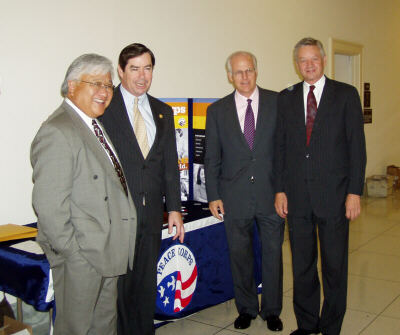
Congressman Thomas Petri explains why he opposed Iraq spending bill
Too many questions on $87 billion package
Congressman explains why he opposed Iraq spending bill
President Bush asked for an additional $87 billion for Iraq and Afghanistan, but when the bill reached the floor of the House, I voted "no." It passed anyway, by a vote of 303 to 125, but I was one of only six Republicans to vote against it. Why?
Of the $87 billion, $65.5 billion is for military operations. I support our troops and think they should get everything they need. I expect that there is the usual waste in that $65.5 billion dollars, but I'm not interested in delaying funds for our forces in the field.
It's the remaining $21.4 billion for "reconstruction" (mostly in Iraq, some in Afghanistan) that I'm concerned about. We have the obligation to re-establish order and basic services, but we need to do it right and avoid simply throwing money at problems.
In the 1960s I served in Somalia both as a Peace Corps volunteer and with the Agency for International Development. I became convinced that an awful lot of our foreign aid activities are ill-conceived, wasteful, and even counterproductive.
$21.4 billion is a lot of money, and by some estimates, another $35 billion will be needed from the U.S. and other countries to bring Iraqi infrastructure up to the standards that somebody (I'm not sure who) seems to think is necessary. Before committing to that, I'd like to be convinced that we have an actual plan for success rather than an assortment of expensive quick fixes.
Before the war we were told that Iraq is a rich country and would be able to pay for its recovery with oil revenues. After all, it has $7 trillion in oil reserves. But now that we are there and theoretically in charge, the rhetoric has shifted to highlight Iraq's massive outstanding debts to France, Germany, Russia and other countries; to the decrepit condition of its oil industry which, apparently, needs massive infusions of cash before it can get at those oil reserves; and to the horrendous condition of its schools, hospitals, roads, electricity and water supplies, and on and on.
We are asked to provide aid for "reconstruction," but in fact, the damage from the war was minimal. What we are really dealing with is 20 years of neglect due to the Iran/Iraq war of the 1980s, Iraq's invasion of Kuwait in 1990, the war and economic sanctions which followed that invasion, and the regime's insistence on spending its money on weapons and palaces for Saddam Hussein and his sons rather than on the needs of its people.
The President's initial request included $9 million to rebuild Iraq's postal service (including establishing a zip- code system), $99 million for new jails, $100 million for dam repairs, $5.65 billion to restore the electric power system, and $290 million to construct fire stations and train firefighters. Some of these items have been cut as a result of the publicity they have received, but I would like to have more study and debate about more complicated provisions.
What, for instance, is the most sensible, cost- effective way to finance oil industry repairs? Should we just fix everything so it's better than new, and then simply give it back to the Iraqis free of charge? What about all these contracts that we are signing with various businesses to bring things up to snuff? What kind of oversight are they getting?
I understand the Administration's urgent need to prove to the Iraqi people and the world in general that we intend to leave Iraq better off than we found it, but I am reluctant to vote for big spending bills before being assured that they've been properly thought through.
